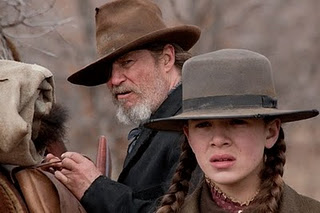Click here to purchase Lexington Movie Tickets.
Charles Portis’ great 1968 western novel True Grit was a book that was largely about death – naturally, the 1969 movie version was about living forever. In fairness, this was the rare case of Hollywood bastardization that had a good reason behind it. The 1969 film was one of the last screen appearances by that most famous of cinematic cowboys, John Wayne, and it was primarily devoted to ensuring his enduring legacy. The core plot of the movie remained the same as Portis’ novel – 14-year-old Mattie Ross hires drunken, elderly U.S. Marshal Rooster Cogburn to help her track down the man who murdered her father. The movie, however, emphasized the meta-resonance of a fading screen legend playing a fading old cowboy who nevertheless ends up triumphant – the eternal cowboy rides into the sunset at film’s close and the eternal Hollywood star won his only Oscar. The film is a moving testament to The Duke – so moving, in fact, that I almost feel bad about pointing out how stupid the rest of that film is, from 21-year-old Kim Darby’s cringe-worthy attempt at playing a 14-year-old to the egregious miscasting of country singer Glen Campbell in a key role.
It’s a film, in other words, that was begging for a remake, and it’s clear from the first scene of the new film adaptation by the great directing duo of Joel and Ethan Coen that they are the perfect men for the job. First, there’s what we hear – Carter Burwell’s graceful hymnal-influenced score, of course, but also voiceover in a rich, archaic Arkansas dialect that savors the words. From the loopy Minnesotan patter of Fargo to the Yiddish-English mixture of A Serious Man, the Coens as writers have always taken great pleasure in lingering on the unusual music of their characters’ accents and dialects, and one of the chief delights of True Grit is absorbing the reverent Coen version of Portis’ Biblically-tinged dialogue.
But more important, perhaps, is the first thing you see – a glowing light, which after a few seconds of a slow zoom is revealed as a warmly lit house, and after a few more seconds is revealed as a warmly lit house with a crumpled body in front of it. It’s a perfect representation of how the Coens see death – not as a remarkable occurrence worthy of highlighting, but as an inevitable part of the fabric of nature, sitting right there waiting for you to look hard enough to see it.
The Coens made their name as purveyors of pitch-black humor and dazzling cinematic style in lark-masterpieces like The Big Lebowski and Blood Simple, but with the Oscar-winning No Country to Old Men in 2007, they began lacing their still-formidable entertainment with a trademark philosophical worldview. No Country (and later A Serious Man) takes place in a world ruled by sharp bursts of violence and the omnipresent specter of death, where man-made law is ineffectual and cosmic law is cruel. You get the sense that there is a God in these films, but He’s an Old-Testament-wrath sort of deity, far more interested in punishing than in saving. And while True Grit is both a deadpan comedy and a coming-of-age story, it too exists in that same kind of universe – this is as much a film about a young girl coming to terms with the unblinking harshness of the world around her (represented in terms that barely squeak by with a PG-13) as it is about her plotted quest for vengeance.
True Grit doesn’t have the gravitas or force of a film like No Country for Old Men. No Country went after its themes with laser-guided precision, while this film is more of an amiable shamble towards its goals. But this film also has something that its predecessors didn’t – specifically, a wider, kinder view of life. Coldness and severity certainly are a key part of the universe, but they’re not the only parts, and placing them alongside genuine human warmth makes both aspects come through more vividly. I wouldn’t go as far as saying that this film marks the birth of a kinder, gentler Coen Brothers. After all, they’re much too good at choreographing exquisite carnage to ever mellow that much. But it is nice to see that, for all their pessimism, this great directing pair is now also willing to acknowledge the unique strength that can be found in the human spirit.
YOU MIGHT ALSO LIKE
Raj reviews Black Swan
Ace reviews Love and Other Drugs the third worst movie of the year








